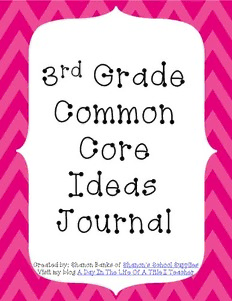
3rd Grade Common Core Standards Journal for Teachers--Pink Chevron PDF
Preview 3rd Grade Common Core Standards Journal for Teachers--Pink Chevron
3rd Grade Common Core Ideas Journal Created by: Shanon Banks of Shanon’s School Supplies Visit my blog A Day In The Life Of A Title I Teacher Thank you for downloading this educational resource created by Shanon's School Supplies, a teacher shopkeeper at Teacher's Notebook, a site dedicated to providing classroom-tested educational resources created by teachers, for teachers. This item is for your personal, non-commercial use. It should not be transferred or transmitted to any other use. You can purchase 3rd Grade Common Core Standards Journal for Teachers - Pink Chevron, for your personal digital library, find more great resources from this teacher-author at their shop, Shanon's School Supplies, or visit Teacher's Notebook for thousands of free and low-cost lesson plans, classroom activities, and more! How to use this journal: Everyone knows that the new Common Core Standards are upon us. With their introduction I know that we are all trying to think of ways implement them in our own classrooms. Have you ever gone to a PD class, heard a great idea, and got back to your own school only to think "what was that amazing thing they said we could do for CCSS.RI.3.2?” Well why not keep a journal with all of the ideas your come up with for each standard! This journal has all of the ELA and Math standards listed with room for you to jot down ideas as they come along. Keep all of your ideas for lessons, centers, remediation, and differentiation in one place year after year! Terms of Use •You can use this product for personal or classroom use. •You may not sell or redistribute all or part of this product as your own work. •You may buy additional licenses rights for more than one classroom or for a whole school at my TPT store Shanon’s School Supplies Special thanks to these wonderful stores for the clipart and backgrounds used in making this product: •Graphics by Lovin Lit •Tracee Orman ELA Reading Literature Ideas RL.3.1: Ask and answer questions to demonstrate understanding of a text, referring explicitly to the text as the basis for the answers. • • • • • • • • RL.3.2: Recount stories, including fables, folktales, and myths from diverse cultures; determine the central message, lesson, or moral and explain how it is conveyed through key details in the text. • • • • • • • • Created by: Shanon Banks of Shanon’s School Supplies RL.3.3: Describe characters in a story (e.g., their traits, motivations, or feelings) and explain how their actions contribute to the sequence of events. • • • • • • • • RL.3.4: Determine the meaning of words and phrases as they are used in a text, distinguishing literal from nonliteral language. • • • • • • • • Created by: Shanon Banks of Shanon’s School Supplies RL.3.5: Refer to parts of stories, dramas, and poems when writing or speaking about a text, using terms such as chapter, scene, and stanza; describe how each successive part builds on earlier sections. • • • • • • • • RL.3.6: Distinguish their own point of view from that of the narrator or those of the characters. • • • • • • • • • Created by: Shanon Banks of Shanon’s School Supplies RL.3.7: Explain how specific aspects of a text’s illustrations contribute to what is conveyed by the words in a story (e.g., create mood, emphasize aspects of a character or setting) • • • • • • • • RL.3.9: Compare and contrast the themes, settings, and plots of stories written by the same author about the same or similar characters (e.g., in books from a series). • • • • • • • • Created by: Shanon Banks of Shanon’s School Supplies RL.3.10: By the end of the year, read and comprehend literature, including stories, dramas, and poetry, at the high end of the grades 2–3 text complexity band independently and proficiently. • • • • • • • • Additional Information: • • • • • • • • Created by: Shanon Banks of Shanon’s School Supplies
